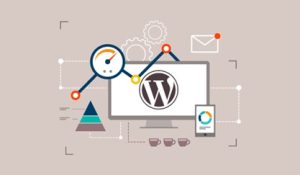Optimizing Your WordPress Site for Speed and Performance
In the fast-paced digital realm, where the attention span of users is shorter than ever, the need for a lightning-fast and responsive website must be balanced.
Whether you’re running a personal blog, an e-commerce platform, or a corporate website, your WordPress site’s speed and performance can significantly impact user experience, search engine rankings, and, ultimately, your online success.

But, regarding your WordPress website, speed optimization is not just good practice; it’s crucial for attracting and retaining visitors. Slow-loading websites can frustrate users and adversely affect your search engine rankings. Fortunately, you can implement strategies and techniques to ensure your WordPress site is lightning-fast.
Let’s first understand how you can test your WordPress Site’s performance: To enhance the performance of your WordPress website, you can utilize various tools designed for this purpose. These tools allow you to evaluate your website’s speed and provide detailed reports based on your URL.
Google PageSpeed Insights1 stands out as a prominent choice among the widely acclaimed tools for assessing website performance. This tool offers valuable insights and recommendations for optimizing your website’s speed and overall user experience. Using Google PageSpeed Insights, you can gain valuable data to improve your WordPress website’s performance without altering the length of your original statement.

Google Lighthouse2, GTmetrix3, WebPageTest4, and Pingdom Tools5 are some of the other tools you can use to test your WordPress Site’s performance. In this blog, we will explore how to optimize your slow WordPress site for speed and performance, covering key topics such as speed optimization, unused plugins and themes, WordPress updates, external HTTP requests, database optimization, CSS and JavaScript, image optimization, and choosing a reliable hosting provider.
1. Speed Optimization: The Need for Speed

- Caching: Utilize caching plugins to store frequently accessed data, reducing server load and page load times.
- Content Delivery Network (CDN): Implement a CDN to distribute your website’s assets across multiple servers globally, reducing latency and speeding up content delivery.
2. Eliminate Unused Plugins and Themes
Unused plugins and themes take up valuable server space, introduce vulnerabilities, and slow down your site. Review your installed plugins and themes regularly and delete those you no longer need.
3. Keep WordPress Up to Date
WordPress updates often include performance enhancements and security fixes. Always keep your WordPress core, themes, and plugins up to date to benefit from these improvements.
4. Minimize External HTTP Requests
External HTTP requests, such as those for social media widgets or third-party scripts, can significantly impact your site’s load time. Minimize these requests by only using essential external services and scripts.
5. Database Optimization
Your WordPress database can accumulate unnecessary data over time, leading to slower queries. Regularly optimize your WordPress database using plugins or manual SQL queries to remove bloat and improve performance.
6. Optimize CSS and JavaScript
Minify and combine your CSS and JavaScript files to reduce the number of requests and file sizes. Enqueue scripts and styles efficiently and consider using asynchronous loading for non-essential scripts.
7. Image Optimization
Large images can be a major cause of slow loading times. Compress and resize images before uploading them and use image optimization plugins to reduce file sizes further without sacrificing quality. Smush6 uses a WordPress plugin to optimize images while uploading.

8. Choose a Reliable Hosting Provider
Your hosting provider is important in measuring your site’s speed and performance. Choose a reliable hosting provider with high-speed servers, SSD storage, and excellent customer support. In conclusion, optimizing your WordPress site for speed and performance is not a one-time task but an ongoing effort. By implementing these strategies and staying vigilant, you can create a blazing-fast WordPress website that keeps visitors engaged and satisfied. Remember that a fast website benefits your users and boosts your SEO rankings and overall online success. So, roll up your sleeves and start optimizing your WordPress site today!
V2Solutions is a trusted digital transformation partner for esteemed brands spanning various industries. Our proven track record of success highlights our pivotal role in guiding brands toward their desired outcomes by applying pertinent and impactful strategies. Our committed team of experts remains tirelessly engaged in the dynamic realm of industry trends, guaranteeing that our clients maintain a competitive edge.